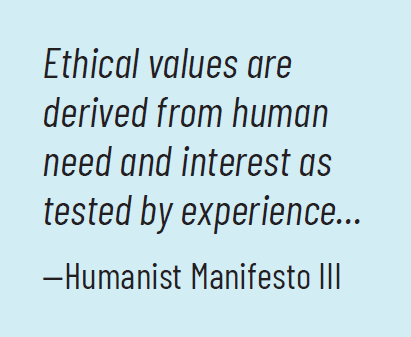PHILOSOPHICALLY SPEAKING | A New Dimension for Humanism?

Why does humanism center human needs and interests alone? Humanist ethics are based on compassion for other humans because we know, from our own lives and from science, that other humans experience suffering and joy just as we do. Most likely, we care about other humans because of our evolved tendencies to cooperate and feel compassion. As humanists, we improve on those evolved ethics through explicit reasoned choices. For example, while we evolved to favor our families, friends, and communities, we recognize that other humans warrant our compassion as well, and grant at least some level of meaningful moral consideration to all humans.
If we care about our fellow humans because of their capacity to experience suffering and flourishing, we’re aligning with a little-known philosophy called sentientism. Like humanism, it commits to using evidence and reason and grants moral consideration to all humans. Sentientism goes further than humanism, though, because humans aren’t the only beings capable of experiencing suffering and flourishing. Those other sentient beings also deserve our moral consideration.
Expanding our Moral Scope
The most obvious candidates for moral inclusion are animals other than humans. While scientific debate continues on the margins (sea sponges, for example, are animals with no brain or nervous system), it’s clear that most animals, particularly those we farm in the trillions, are sentient. If we care about suffering and flourishing then it’s sentience, not species membership, that matters.
The diversity of sentient beings is already breathtaking, and science indicates that degrees and types of sentience might vary substantially. Other animals are likely to experience pain and pleasure differently from humans, but their ability to experience still warrants at least a base level of moral consideration. Eventually, we may also create or come across new types of sentient beings: advanced artificial intelligences or even alien species. It may seem fanciful, but surely a forward-looking ethical worldview should help us think about how we should treat those beings and how they should treat one another, even as we also worry about how they will treat us.
Movement Synergy
Sentientism expands humanism, already a critical philosophy and growing global movement. Like humanism, sentientism is pro-human rights—anti-sexist, anti-racist, anti-ageist, anti-nativist, anti-fascist and anti-LGBTQ-phobic. Sentientism embraces science, reason, and evidence, and therefore opposes fabrication, fake news, unsubstantiated conspiracy theories, moral relativism, and religious and supernatural thinking. All the problems we face—from the existential threats of climate change, nuclear war, and biological and technological developments, to the immediate challenges of global poverty and hunger—are better addressed with facts and critical thinking than with dogma.
We strive to bring about a progressive society…through a continued refinement and advancement of the humanist worldview.
—American Humanist Association’s About page
As the above statement from the AHA website makes clear, humanism is not static. Reason and science help us to continue building a stronger foundation for our ethics. We are coming to understand more about sentient minds, what our experiences have in common with those of other species, given our shared evolutionary history, and how we can help one another reduce suffering and flourish together.
There are two practical ways in which sentientism expands and updates humanism:
- For many humanists, animal well-being is already a critical issue in its own right, given the more than 100 billion land animals (and trillions of sentient sea animals) we harm and kill each year for food, drink, and other animal products as well as for entertainment and research (according to UN Food and Agriculture Organization). While many humanist organizations already grant moral consideration to animals other than humans (for example, Humanists UK and Humanists International already include concern for animals in their definitions of humanism), sentientism puts sentience as the central qualifier for moral consideration, not an add-on to humanity. As such, it views needlessly causing the suffering and death of any sentient being as ethically wrong, just as humanism would see needlessly causing the suffering and death of humans as ethically wrong.
- Sentientism also helps us think through and prepare for the implications of artificial intelligences (AIs), should we (or they) design themselves such that they are sentient. We need to crystallize and evolve our own ethics to help us direct or align the ethics of AIs safely—the concepts of sentience, evidence and reason help to do that. We also need to think carefully about the rights and moral consideration we might need to grant to AIs themselves if or when they attain and even increase in sentience.
Aligning Our Menus with Our Values
 In a 2019 show-of-hands poll of an audience of around a thousand U.K. humanists, approximately forty percent said they were vegan or vegetarian—a rate much higher than that of the general population. Once again, humanists are leading the way on an important ethical topic. If you’re a humanist and a morally motivated vegan or vegetarian, you’re likely to already be thinking in a sentientist way.
In a 2019 show-of-hands poll of an audience of around a thousand U.K. humanists, approximately forty percent said they were vegan or vegetarian—a rate much higher than that of the general population. Once again, humanists are leading the way on an important ethical topic. If you’re a humanist and a morally motivated vegan or vegetarian, you’re likely to already be thinking in a sentientist way.
One small change we could make would be to serve only plant-based foods in our organizations. We would be directly reducing the suffering we cause while at the same time leading by example. Whereas our predecessors may have focused exclusively on human sentience, we have both awareness of animal suffering and the means to reduce it—or at least to stop causing more of it. In most of the US, we have access to many alternative forms of protein and have no need to consume animal protein.
Prior to the pandemic, Amy Halpern-Laff introduced a program called “Green Sunday.” On the day many communities traditionally meet and reaffirm our values, we include all sentient beings in our circle of moral obligation. Several of our humanist communities have begun to implement this program.
We Are Activists
Humanists are active leaders. We oppose all forms of oppression and exploitation of marginalized populations, often before more mainstream progressives. We should be out front opposing animal oppression and exploitation as well. Transitioning away from animal farming is also an important step toward reducing our negative impact on the environment, including greenhouse gas emissions (methane and CO2); land, water, and energy use; and pollution. These have long been humanist concerns.
Sentientism has been a niche academic term since its development by ethical thought leaders including Richard D Ryder and Peter Singer in the 1970s. As with humanism, it has ancient roots in many cultures around the world, both in its concern for animals (e.g. Jain, Buddhist, Arabian and Greek thinkers) and its naturalistic outlook. Many Enlightenment humanist thinkers also outlined sentientism even before the term existed, including Jeremy Bentham when he posed “Can they suffer?” as a moral criterion. In recent decades, we have seen a rise in animal rights awareness and activism that seems likely to accelerate given environmental and ethical pressures.
A humanist movement that embraces sentientism is likely to attract people who care about animal welfare and thus strengthen both movements. It appears, anecdotally, that ethical vegans and vegetarians are more likely to be atheists or humanists than the general population. That’s probably because compassion, supported by evidence and reason, underlies both viewpoints. There’s a powerful synergy of naturalism and broad compassion.
Humanism has a proud history of intellectual and moral courage—unconstrained by harmful traditions, social norms, fabrications, or dogma. Let’s build on that proud history by expanding humanism to clearly and robustly include sentientism, however uncomfortable that may feel at first. An expansive humanism that recognizes all suffering matters can more effectively address the world’s problems—for us human beings, for quadrillions of other sentient beings, and for the planet we all share.
